Related Research Articles

David was a Welsh bishop of Mynyw during the 6th century. He is the patron saint of Wales. David was a native of Wales, and tradition has preserved a relatively large amount of detail about his life. His birth date, however, is uncertain: suggestions range from 462 to 512. He is traditionally believed to be the son of Non and the grandson of Ceredig ap Cunedda, king of Ceredigion. The Welsh annals placed his death 569 years after the birth of Christ, but Phillimore's dating revised this to 601.
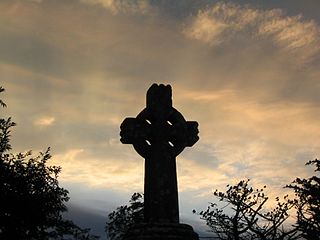
Celtic Christianity is a form of Christianity that was common, or held to be common, across the Celtic-speaking world during the Early Middle Ages. Some writers have described a distinct Celtic Church uniting the Celtic peoples and distinguishing them from adherents of the Roman Church, while others classify Celtic Christianity as a set of distinctive practices occurring in those areas. Varying scholars reject the former notion, but note that there were certain traditions and practices present in both the Irish and British churches that were not seen in the wider Christian world.

Neot was an English monk. Born in the first half of the ninth century, he lived as a monk at Glastonbury Abbey. He preferred to perform his religious devotions privately, and he later went to live an isolated life in Cornwall, near the village now called St Neot. His wisdom and religious dedication earned him admiration from the monks. He visited the Pope in Rome, who instructed him to found a monastery in Cornwall.

Amandus, commonly called Saint Amand, was a bishop of Tongeren-Maastricht and one of the great Christian missionaries of Flanders. He is venerated as a saint, particularly in France and Belgium.

Christian monasticism is the devotional practice of Christians who live ascetic and typically cloistered lives that are dedicated to Christian worship. It began to develop early in the history of the Christian Church, modeled upon scriptural examples and ideals, including those in the Old Testament, but was not mandated as an institution in the scriptures. It has come to be regulated by religious rules and, in modern times, the Canon law of the respective Christian denominations that have forms of monastic living. Those living the monastic life are known by the generic terms monks (men) and nuns (women). The word monk originated from the Greek μοναχός, itself from μόνος meaning 'alone'.

Paul Aurelian was a 6th-century Welshman who became first bishop of the See of Léon and one of the seven founder saints of Brittany. He allegedly died in 575, rumoured to have lived to the age of 140, after having been assisted in his labors by three successive coadjutors. This suggests that several Pauls have been conflated. Gilbert Hunter Doble thought that he might have been Saint Paulinus of Wales.

June 3 - Eastern Orthodox Church calendar - June 5

June 5 - Eastern Orthodox Church calendar - June 7

Saint Blane was a bishop and confessor in Scotland, born on the Isle of Bute, date unknown; died 590. His feast is kept on 10 August.

March 4 - Eastern Orthodox liturgical calendar - March 6
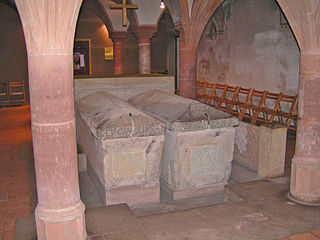
Saint Valerius of Treves (†320) was a semi-legendary Bishop of Trier. His feast day is 29 January.
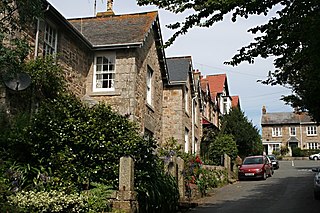
Gulval is a village in Cornwall, England, United Kingdom. Although historically a parish in its own right, Gulval was incorporated into the parishes of Ludgvan, Madron and Penzance in 1934, and is now considered to be a suburb of Penzance. Gulval still maintains its status as an ecclesiastical parish and parts of the village church date back to the 12th-century. Together with Heamoor, Gulval still retains its status as an electoral ward. The ward population at the 2011 census was 4,185.
Erc mac Dega, also known (incorrectly) as Herygh, was an Irish saint. He was active in Cornwall. Tradition ascribes the foundation of the original monastery on the Hill of Slane to him.
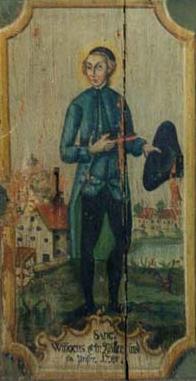
Winnoc was an abbot or prior of Wormhout who came from Wales. Three lives of the saint are extant. The best of them is the first life, which was written by a monk of Bertin in the mid-9th century or perhaps a century earlier.
There is archaeological evidence of insular monasticism as early as the mid 5th century, influenced by establishments in Gaul such as the monastery of Martin of Tours at Marmoutier, the abbey established by Honoratus at Lérins; the abbey of Mont-Saint-Michel; and that of Germanus at Auxerre. Many Irish monks studied at Candida Casa near Whithorn in what is now Galloway in Scotland.

Eastern Christian Monasticism is the life followed by monks and nuns of the Eastern Orthodox Church, Oriental Orthodoxy, the Church of the East and Eastern Catholicism. Eastern monasticism is founded on the Rule of St Basil and is sometimes thus referred to as Basilian.
Heribert Rosweyde was a Jesuit hagiographer. His work, quite unfinished, was taken up by Jean Bolland who systematized it, while broadening its perspective. This is the beginning of the association of the Bollandists.

Saint Teilo, also known by his Cornish name Eliud, was a British Christian monk, bishop, and founder of monasteries and churches. He was from Penalun (Penally) near Tenby in Pembrokeshire, south Wales.
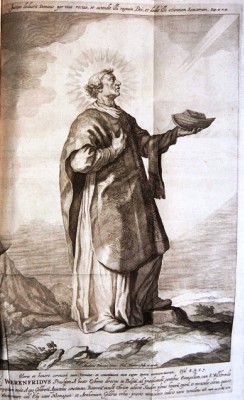
Saint Werenfried was an English Benedictine monk, priest and missionary among the Frisians. His intercession is thought to relieve the pain of arthritis and to help gardeners. His feast day is 14 August.
Saint Bécán was an Irish monk who founded a monastery at Kilbeggan and is considered by some to be one of the Twelve Apostles of Ireland. His feast day is 5 April.
References
. Dictionary of National Biography . London: Smith, Elder & Co. 1885–1900.